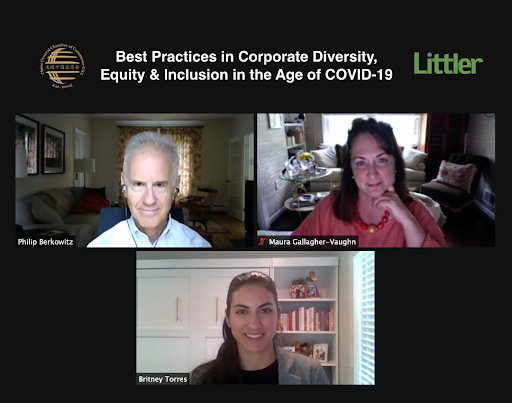
On June 2nd, 2021, China General Chamber of Commerce-USA (CGCC) and Littler co-hosted a webinar entitled “Best Practices in Corporate Diversity, Equity & Inclusion in the Age of COVID-19”.
The panelists included:
- Maura Gallagher-Vaughn, UBS Financial Services, Head of Diversity and Inclusion, Americas Region and GWM
- Britney Torres, Shareholder, Littler, San Francisco
- Philip Berkowitz, Member of the CGCC Legal Counsel Committee; Shareholder, Littler, New York
The panel focused on the increasingly important emphasis on Diversity, Equity, and Inclusion (DE&I) among employers—its legal and societal origins, how DE&I can enrich a corporate culture, and best practices for making it work in a legally compliant manner. Ms. Gallagher Vaughn defined DE&I as encompassing the following:
Diversity is what describes the organization, together. We work to ensure that the organization has a diverse employee base that represents the full range of invisible differences such as sexual orientation, veteran status and religion, as well as visible difference such as gender and ethnicity;
Equity is what creates equality of opportunity through programs, policies, and practices that eliminate barriers and create fair access to opportunities to reach one’s full potential; and
Inclusion means bringing everyone into the conversation by creating, strengthening, and sustaining an open environment in which everyone is equally valued and appreciated for the talent they bring to the workplace. Inclusion is the key that maximizes our talent to deliver the best the organization can be.
The speakers also spoke about how employers can best respond to the recent surge in hate crimes on the basis of ethnicity. They emphasized the need to have a plan and that the plan should lead with empathy for employees and their communities. Panelists also noted that organizations need to acknowledge the environment and the incidents when they occur and voice both external and internal support for colleagues.
In some cases, that support could mean broadening the organizations’ community affairs agenda and providing opportunities to enhance corporate and employee giving or garnering internal supportive resources for employees.
CGCC sincerely thanks all panelists for sharing their unique insights and perspectives with the CGCC community.
If you would like to watch the event recording, kindly contact Hallie Carmen at hallie.carmen@cgccusa.org.
